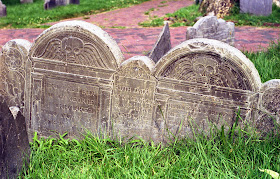 |
| 1729 engraving of Boston Light |
Worthylake also maintained a farm on Lovell’s Island, closer to Boston.Worthylake was paid £50 a year, which was raised to £75 in 1717. He made additional money as a harbor pilot for incoming vessels, and he also kept a flock of sheep on Great Brewster Island. Fifty-nine of his sheep were caught on the long sand spit off Great Brewster during a 1717 storm; they drowned when the tide came in.
In early November 1718, Worthylake went to Boston with his wife and their 15-year-old daughter Ruth. They reportedly attended church in Boston on Sunday, November 2. Some sources indicate that Worthylake also picked up his pay during the visit to the city; in any case, they left to return to Boston Light on Monday morning, November 3.
On their way back they stopped at Lovell’s Island, where Worthylake and his wife and daughter boarded a sloop heading for Boston Light. A friend, John Edge, accompanied them. Witnesses later said that the party were seen to eat and drink “very friendly” while aboard the sloop, “tho not to excess.”
The sloop anchored near Little Brewster Island a little few minutes past noon, and the slave Shadwell paddled out in a canoe to transfer the party to the island. Young Ann Worthylake and a friend, Mary Thompson, watched from shore. Suddenly, the two girls on shore saw “Worthylake, his wife & others swimming or floating on the water, with their boat Oversett.”
 |
| The Worthylake grave in Boston |
Benjamin Franklin, 12 years old at the time, was urged by his brother to write a poem based on the disaster. The young Franklin wrote a poem called The Lighthouse Tragedy and hawked copies on the streets of Boston. Franklin later wrote in his autobiography that the poem was “wretched stuff,” although it “sold prodigiously.”
No copy of the poem was known to exist until 1940, when a copy was discovered in an abandoned house on a nearby island by Maurice Babcock, Jr., son of the principal keeper of Boston Light. Edward Rowe Snow, a popular historian of the New England coast who lived nearby in Winthrop, Massachusetts, helped him identify what he had found. In the video clip above, recorded in 1988, he describes finding the poem.
Because the copy could not be authenticated, it's not known for certain if it's what Franklin wrote. Here is the poem found by Babcock:
The Lighthouse Tragedy
Oh! George. This wild November
We must not pass with you
For Ruth, our fragile daughter,
Its chilly gales will rue.
 |
| Maurice Babcock, Jr., with the poem he found, circa 1940. |
So, home to Lovell's Island
Take us when fails the sea
To the old house where comfort
And better shelter be.
Comes the long weary winter
With its storms of driving snow;
I can only watch the beacon
Sure that you are near its glow.
Yes, dear wife, my constant service
Binds me to this narrow isle,
Love must ever yield to duty
Though the heart be sad the while.
Only grant that on the morrow
We may safely pass the sea,
I can bravely bear my sorrow
You and Ruth here will not be.
With wild nor'wester came this morning,
Cold and clear the heartless sky.
Come wife, take Ruth. The pull will be long.
So - into the boat I will row you home.
Nestled within her mother's cloak
Frail Ruth is sheltered from the blast,
While Anne looks into George's face
With quick, strong strokes they leave the shore.
Though starting in the Brewster's lea,
Rough and empty rolls the sea.
Low the boat -- too deeply laden
Heavy hearts make heavy burden.
Now they reach the open channel
Where the flood tide breasts the gale
Rears a toppling wall of water.
Making Anne's cheeks grow pale.
Quick the prow is upward borne
George in Ann's arms is thrown
Husband, wife and child together
To the chilly waves have gone.
Frenzied clasp of wife and daughter
Bears the sturdy swimmer down,
Save the boat upon the water
Nothing of their fate is known.
Que raridade!
ReplyDeleteNão me pareceu tão desalinhado para o primeiro poema de B. Franklin!
Obrigado ao dono do blog.
It's amazing a dude from Brazil knows so much about Boston history. Kudos. What part of Brazil are you from?
DeleteHi thanks for postting this
ReplyDeleteHow could the foto be placed atop the poem? Can some worthy move it, for heaven’s sake?
ReplyDeleteI'm a teacher from Boston and this is the first and ONLY copy of the entire poem I can find BUT ALAS! the picture is superimposed on the words! How tragic!
ReplyDeleteReading enjoyment: THE BENJAMIN FRANKLIN SAMPLER, I followed up on The Lìghthouse Tragedy when I found this listing of said ballad. In so doing found a typo error on Blogger.com: confusing dated June29,2014. Perhaps Out of Context.
ReplyDelete.